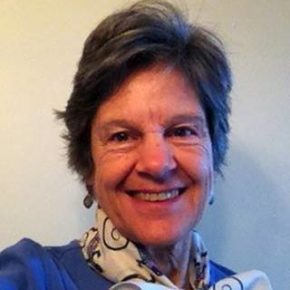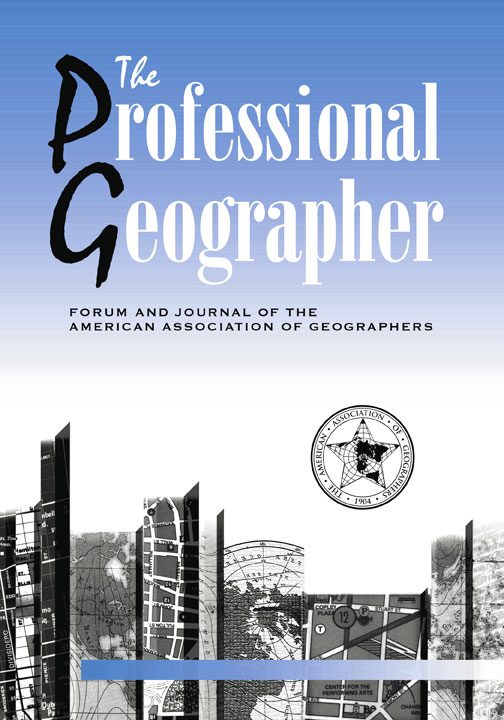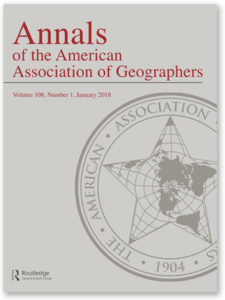2021 AAG Honors Announced
Each year, the AAG invites nominations for AAG Honors to be conferred in recognition of outstanding contributions to the advancement or welfare of the profession. The AAG Honors Committee and the AAG Council are pleased to announce the following AAG Honorees.
2021 AAG Lifetime Achievement Honors
 Dr. Carol Harden, University of Tennessee Knoxville
Dr. Carol Harden, University of Tennessee Knoxville
Carol Harden, the 2021 recipient of the AAG’s Lifetime Achievement Honors, is the quintessential field scientist, professional association leader, and effective science communicator. She has been at the forefront of advancing geography’s role in the natural sciences, whether in the AAG, National Research Council, National Geographic Society, or National Science Foundation. Over a half-century career, Harden has established herself as one of the leading figures in contemporary physical geography and environmental science. More broadly, she has had a tremendous influence across our entire discipline, owing to the many roles she has played at the University of Tennessee, AAG, National Research Council, and National Geographic Society, and as editor of Physical Geography.
Since the 1980s, Harden has done fieldwork in the Andes, including a year on a Fulbright to Ecuador. Her commitment to international fieldwork and diversity in geography and other field disciplines and her encyclopedic knowledge of physical geography allows her to evaluate critically, and advocate for support of, fieldwork, especially by diverse scholars from around the world. In addition to her Latin American research, she has generated a substantial body of research in the U.S., mainly in Appalachia, on soil erosion, watershed hydrology, water quality, and human impacts.
Harden is currently the Chair of the Geographical Sciences Committee and a Member of the Board on Earth Sciences and Resources, both for the National Academies of Science, Engineering, and Medicine (NASEM). She was recently a member of the prestigious and influential Committee on Research and Exploration of the National Geographic Society. She has also served as a member and Chair of the Nominations Committee, Geology, and Geology Section, American Association for the Advancement of Science (AAAS). Harden was a member (2017) and then Chair (2016-2020) of the Geographical Sciences Committee (GSC-NASEM). In 2010-2012, Harden served first as Vice President and then as President of the American Association of Geographers. She is a compassionate listener and a fair-minded leader. Harden is a mentor with an impact on cultivating new and early-career disciplinary leaders. She does this with a clear vision of geography’s role in science, higher education, and society, allowing her to see and realize new opportunities and build new initiatives. A strong sense of collegiality and caring has allowed her to engage in constructive and productive dialog across several disciplinary divides. For these qualities and achievements, the AAG recognizes Carol Harden as the 2021 recipient of the AAG Lifetime Achievement Honors.
2021 AAG Distinguished Scholarship Honors
 Cindi Katz, City University of New York (CUNY)
Cindi Katz, City University of New York (CUNY)
Cindi Katz is internationally renowned for her scholarship on social reproduction, children’s geographies, political ecology, global economic restructuring and the connections between the production of space and nature. As a pioneering scholar of Marxist feminist theory, Katz was one of the first geographers to investigate the important contributions of feminist theory to questions of space and time in the discipline. Her academic record testifies to her history of innovative work, theory-driven insights, and field-shaping interventions.
One of Katz’s most influential scholarly contributions lies in the realm of social reproduction. Her scholarship has convincingly shown how capitalist accumulation depends heavily on the unpaid or low paid labor of women. This feminist insight, which Katz highlighted and made prominent in geographical scholarship, has been one of the most critical ideas in Marxist feminist theory of the past three decades. Katz has compelling demonstrated the uneven effects of capitalist accumulation from the relational standpoint of women, children, and marginalized communities who bear the burdens of social reproduction even as their lives and livelihoods become increasingly precarious.
In a series of theoretical interventions and empirical studies, Katz also helped to establish and develop the field of children’s geographies. Her work interprets the political economy of development in relation to personal development (from childhood to adulthood), arguing that neither form of development can be understood without the other. Her seminal contributions in this area include improved understandings of how place and space shape children’s lives, and in terms of how the gendered, raced and classed experiences of children shape place and space. Katz has also made sustained and significant epistemological contributions to Marxist feminist theory, developing two theoretical concepts that have had far reaching impacts on geography and cognate disciplines. The first of these is the concept of “minor theory” which engages with the ways power and authority shape how geographic knowledge is practiced and produced. Here Katz’s theorization is noteworthy for offering a way of working through the contradictions and limits of mainstream theory to develop more engaged and accurate accounts of the everyday world. Her other theoretical advancement is that of counter-topography, which is a means of recognizing the historical and geographical specificities of particular places while recognizing their analytic connections to specific material social practices. These theoretical contributions illustrate one way in which Katz’s scholarship has shaped the course of debates within the discipline, as well as influencing the research agendas and inter-subjective practices of other scholars.
In sum, Katz’s has made an immense impact on contemporary human geography. Her theoretical and empirical contributions to geography and beyond are of the highest quality. Her enthusiasm for her field and relentless efforts to identify and transform exploitative power relations have had a profoundly positive influence on geographic theory, practice, and education. Katz’s scholarship is among the most significant in the discipline. For these reasons, the AAG recognizes Cindi Katz as the 2021 recipient of the AAG’s Distinguished Scholarship Honors.
 James Tyner, Kent State University
James Tyner, Kent State University
James A. Tyner models the best practices of engaged and relevant scholarship in critical human geography. In more than two decades of professional work, the majority of them at Kent State University in Ohio, Tyner’s academic productivity has been prolific—more than twenty books; at least one hundred and twenty refereed articles; and myriad conference presentations, panels, and keynotes. The distinction of his scholarship extends beyond conventional quantitative assessments, however; Tyner’s evolving scholarship has provided a powerful moral and ethical voice for those who study social justice, conflict, and violence.
His book War, Violence, and Population: Making the Body Count provides a grounded analysis of violence and conflict in Vietnam, Cambodia, and Rwanda. It received the prestigious Meridian Book Award in 2010. Tyner’s work on conflict and violence has become more focused on South East Asia, specifically Cambodia. He provides novel and innovative analyses of the places, landscapes and experiences of violence. Tyner’s approach to this work is profound as he couples a continued theoretical journey with, as one essayist, Sabina Lawreniuk in the AAG Review of Books, puts it, “the fortitude to trace meticulously through the material, nonmaterial and never materialized fragments of Cambodia’s past—texts, landscapes, bodies, bones and memories” to ask how Cambodia’s violence was made. Explorations of memory and memorialization appear elsewhere in Tyner’s individual and shared work, always with an insistence and invitation for moral and ethical analysis on the part of the reader. As one of the letters of support noted, his “broader research trajectory takes the lives of the marginal and vulnerable seriously.” Reviewers of his work, elsewhere, describe it as accessible, powerful, timely, vivid and compelling.
Tyner’s approach to scholarship reveals an engagement with place-based fieldwork, archival work, but also, the applications of remote-sensing and hydrological analyses. His research has been supported by two significant National Science Foundation grants and has been recognized repeatedly by his peers inside and outside of Geography. He has also been recognized as a researcher by several AAG Specialty groups and has received both the Glenda Laws Award, the Jim Blaut Award, and the Julian Minghi Book Award.
A complement to Tyner’s powerful and relevant academic scholarship is his public scholarship at Kent State University and beyond. Tyner has been recognized by his colleagues at Kent State for his leadership in organizing scholarly events related to memory, violence and conflict. He was recently appointed as Director of the Institute for the Study and Prevention of Violence. Tyner’s commitment and generosity extends to his mentoring and encouragement of graduate students and junior scholars, which has been repeatedly recognized at his home institution. The professional pathway of Tyner reveals a significant and enduring contribution to transformative and grounded research, an indefatigable productivity for formal academic and public scholarship, and a deep and enduring commitment to social justice and human dignity. For these reasons, James A. Tyner is the 2021 recipient of AAG’s Distinguished Scholarship Honors.
2021 Ronald F. Abler Distinguished Service Honors
 The AAG awards the Ronald F. Abler Distinguished Service Honors for 2021 to Joseph Oppong for his exceptional service and commitment to the discipline of geography and geographers. Oppong has served generously and effectively in numerous support and leadership roles within the AAG and beyond. Oppong’s service, research, teaching, and graduate advising has focused energy and attention on the geography of Africa and on the superb work of African scholars from around the world. He is further
The AAG awards the Ronald F. Abler Distinguished Service Honors for 2021 to Joseph Oppong for his exceptional service and commitment to the discipline of geography and geographers. Oppong has served generously and effectively in numerous support and leadership roles within the AAG and beyond. Oppong’s service, research, teaching, and graduate advising has focused energy and attention on the geography of Africa and on the superb work of African scholars from around the world. He is further
credited, through his own research and tireless support of numerous organizations and individuals, with having played a key role in helping to bring medical geography to the forefront of our discipline in recent years.
Oppong’s contributions to the AAG’s African Specialty Group (ASG) are difficult to capture in a few words, but suffice it to say that he has been a pillar of the ASG since the early 1990s. He helped to popularize the group, expand participation, and further internationalize membership for both the ASG and for the entire AAG. Under Oppong’s leadership, the ASG become not only a preeminent forum to discuss scholarship on the geography of Africa, it quickly became the preeminent place to meet and discuss African geography with African scholars and students. Oppong has helped guide the ASG to become one of the more active specialty group communities within the AAG as well as a dynamic professional bridge between AAG members and African geographers from around the world. While serving in leadership roles in the ASG, Oppong also helped in the effort to revive the scholarly journal the East African Geographical Review, renaming it the African Geographic Review and quickly establishing the journal as a robust and preferred forum for cutting-edge research related to Africa.
Oppong also played a key role in the recent expansion of medical geography through his own research, his graduate advising, and his unflagging service to the AAG’s Medical Geography Specialty Group (MGSG). Oppong served as chair of the MGSG from 2002-2005 and he has been an active member ever since. His own pioneering work on HIV/AIDS in Africa remains critical to the subfield. In short, Oppong’s medical geography research is fashioned as a therapeutic to a public health crisis that continues to ravage communities around the world, but with particularly egregious effects on the people of Africa. In addition to his unique contributions to the ASG and MGSG, Oppong has served on the editorial board of the Professional Geographer, served on multiple NSF panels, and been a steering committee member and US representative, for the International Geographers Union’s Commission on Health and Environment. Oppong’s commitment to our discipline, to supporting its practitioners, and to supporting the AAG’s internationalization, especially among African geographers, stands as an example to all AAG members and therefore warrants the 2021 Ronald F. Abler Distinguished Service Honors.
 Patricia Solís, Executive Director of the Knowledge Exchange for Resilience (KER) and Research Associate Professor at Arizona State University
Patricia Solís, Executive Director of the Knowledge Exchange for Resilience (KER) and Research Associate Professor at Arizona State University
The AAG’s Ronald F. Abler Distinguished Service Honors for 2021 is awarded to Patricia Solís, Executive Director of the Knowledge Exchange for Resilience (KER) and Research Associate Professor in the School of Geographical Sciences and Urban Planning at Arizona State University. Solís is an international leader in facilitating geospatial collaborations around local and global sustainability in novel ways that involve partners in higher education and institutions around the world.
Solís is truly innovative in her approach to develop and execute transformative programs. She has developed more than 50 programs promoting innovations in research, education, and community collaboration, funded by substantial support from federal agencies. Many of these programs seamlessly combine service to local and global communities with advancing the discipline of geography. One example of this is Solís’ work to fund and co-found YouthMappers, an international network of university students and faculty working to support the creation and use of open geospatial data for humanitarian and development assistance. In YouthMappers, Solís strives to help youth develop their leadership skills through mentoring and training in geospatial techniques. Meanwhile, these youth leaders join what Solís refers to as the geospatial revolution, which supports improving the quantity and quality of open geospatial data and geographic knowledge to support improved decision making and policies that lead toward greater resilience.
Solís is now serving as director of KER, where she once again demonstrates her innovative programming. KER is a program that aims to build community resilience in Maricopa County, Arizona, by linking multi-sector community needs with research innovations. Most recently, KER worked to bridge the community and university to improve the area’s resilience to COVID-19.
Solís has served the AAG for many years, including as Deputy Director, Director of Research and Outreach, and Director of Strategic Initiative. In these roles she implemented activities—including revitalizing specialty groups, supporting developing regions, and embracing diversity and inclusion––that transformed the organization, caused membership to surge, and aligned geography within the context of major global challenges such as climate change and sustainable development. During this time, she also played a part in establishing a multimillion-dollar endowment for the AAG, improving the organizations’ productivity and visibility—yet another way in which she has contributed to be transforming the lives of youth and advancing geography. As Ron Abler himself said of Solís’ service: geography’s future will “continue to brighten thanks to her manifold contributions throughout the Americas.”
2021 AAG Gilbert White Distinguished Public Service Honors
 Timothy Trainor, US Bureau of the Census
Timothy Trainor, US Bureau of the Census
Timothy Trainor, the 2021 recipient of the AAG’s Gilbert F. White Public Service Honors, has devoted more than four decades to public service. He worked at the U.S. Census Bureau from 1980 to 2018, rising from a senior cartographer position to become chief of the geography division and chief geospatial scientist. Over that time, Trainor helped develop and refine multiple waves of innovations that consistently delivered statistically sound collection, integration, and application of geographic and demographic data for those who use this critical public resource. His accomplishments served as the basis for continuous improvements in the work of the census bureau and provided a model for work carried out in numerous nations around the world.
Especially noteworthy during Trainor’s career at the census bureau, he championed the creation and enhancement of the Topologically Integrated Geographic Encoding and Referencing (TIGER) System, the first seamless, topologically integrated map of the nation. He promoted the publication of TIGER data through multiple media, and he instituted the ongoing update of the bureau’s Master Address File (MAF), a national list of all housing units in the nation. He led efforts to ensure each address record in the MAF was linked to a geospatial coordinate in TIGER. These datasets build the foundation for accurate census and survey taking and the production of reliable statistics at local levels of geography across the United States.
Concurrent with his work within the census bureau, Trainor actively and consistently engaged colleagues in open, collaborative, and productive ways. He played a key role in advancing the organization and activities of the Federal Geographic Data Committee, and he was an effective voice for
both the federal and commercial sides in inspiring and advancing the Geospatial Data Act of 2018.
Trainor made strong contributions to international efforts to advance geographic methods and inquiries. He held leadership positions in a number of international organizations, including the International Cartographic Association, of which he was vice president from 2007 to 2015 and is president from 2019 to 2023. He also helped institute the United Nations Committee of Experts on Global Geospatial Information Management, which he co-chaired from 2015 to 2018. Following his retirement from the census bureau, Trainor continues to serve as a consultant to the United Nations, helping to guide the development of the Integrated Geospatial Information Framework, an effort destined to change the way that countries collect, manage, and disseminate geographic information.
Over his career, Trainor repeatedly provided opportunities for others to learn, grow, and participate in the development of geographic data as a public good. His mentorship to many individuals, including many women and persons of color, enabled many of his colleagues to move into leadership roles and continue to advance the important work he has pursued. For these reasons, the AAG has selected Timothy Trainor as the 2021 recipient of the Gilbert F. White Public Service Honors.
2021 Distinguished Teaching Honors
 Barbara “Babs” Buttenfield, University of Colorado-Boulder
Barbara “Babs” Buttenfield, University of Colorado-Boulder
Barbara (“Babs”) Buttenfield is an innovator in GIScience education. She established one of the first college curricula in GIScience and has been influential in the development of GIScience certificate programs. Buttenfield was also one of the founding members of the University Consortium for Geographic Information Science (UCGIS) and contributed to the advancement of UCGIS’s educational mission. In recognition of her exemplary contributions to GIScience education, UCGIS awarded Buttenfield the inaugural GIS Educator of the Year award in 2001.
Buttenfield is a gifted educator whose courses are well received by students and peers. She particularly excels in the design and instruction of laboratory classes, where she artfully balances theoretical concepts with technical skills. Her ability to explain complex concepts using examples and metaphors is legendary, and she exudes an infectious enthusiasm for GIScience. Buttenfield delivers cutting edge course content, in part informed by her own highly-regarded research. She also is a dedicated mentor and has advised over 60 PhD and Masters students, many of whom are now leaders in GIScience. Buttenfield is equally committed to undergraduate mentoring, and each semester invites undergraduate students to serve as teaching interns. To date, over 80 students have benefited from the additional experience in GIScience problem-solving and in-service learning available through this opportunity.
Throughout her career, Buttenfield has promoted the training and retention of a GIScience workforce and the development of best practices in GIScience teaching. She also co-edited the popular reference work, Map Generalization: Making Rules for Knowledge. Moreover, she has held leadership roles in GIScience-related professional societies, including serving as President of the Cartography and Geographic Information Society. Buttenfield provides valuable consultation on GIScience, notably as a member of the National Research Council’s Mapping Science Committee and the U.S. Census Bureau’s Scientific Advisory Committee. These activities, coupled with her extraordinary teaching and mentoring and innovations in curriculum design, make Barbara Buttenfield the outstanding 2021 recipient of the AAG’s Distinguished Teaching Honors.
2021 AAG Media Achievement Award

Richard Campanella, Tulane University
The AAG’s Media Achievement Award for 2021 goes to Richard Campanella, Professor of Practice in the School of Architecture at Tulane University, where he also remains the only geographer on campus. As a scholar of New Orleans and the wider Gulf Coast, Campanella has authored seven monographs published by university presses and four popular books as well as dozens of journal articles and book chapters on the historical geography and cultural landscapes of New Orleans, Louisiana, and the Gulf Coast.
Most pertinent to this particular honor, Campanella makes his research accessible to a general audience of avocational geographers, using popular media to engage the public in geographical scholarship. He combines historical maps, GIS, landscape photography, and accessible prose to explain for readers of his essays such quintessentially geographical topics as the origins of neighborhoods, street names, cadastral systems, settlement patterns, architectural styles, topography, hydrological engineering, and many other elements of the local landscape. His nearly 200 essays in the Times-Picayune, The Advocate, Louisiana Cultural Vistas, 64 Parishes, The Atlantic, and other popular periodicals testify that the reading public appreciates geographical insights into the places they call home. For those more inclined to view than read, he has created an online video series called The Geographer’s Space, currently up to nine episodes of about five minutes long each, that reprise some of his essays in 64 Parishes, a project of the Louisiana Endowment for the Humanities. Augmenting that prolific output of newspaper columns, magazine essays, and videos, Campanella provides followers of his Twitter feed @nolacampanella near daily insights into the historical emergence of the Crescent City’s landscapes, often placing a street scene from the late nineteenth or early twentieth century in its present context. He is also a popular speaker, delivering not only keynotes at academic conferences such as the National Humanities Conference, but also public talks at venues throughout the region.
As one of his nomination letters puts it, “he has become the unofficial geographer laureate for New Orleans and has reached a broad swath of the local and regional reading public.” In fact, in bookstores all along the Gulf Coast, one will usually find at least one book by Campanella, and often a whole shelf full. He unquestionably exemplifies the letter and spirit of this award to recognize “exceptional and outstanding accomplishments in publicizing geographical insights in media of general or mass communication.” (Photo Credit: Paula Burch-Celentano of Tulane University)
Since 1951, AAG Honors have been offered annually to recognize outstanding accomplishments by members in research and scholarship, teaching, education, service to the discipline, public service outside academe, and for lifetime achievement. The AAG Honors Committee is elected by the AAG membership and charged with making award recommendations for each category, with no more than two awards given in any one category. This year’s Honors Committee members are Julie A. Silva, University of Maryland College Park (Chair); Amy Glasmeier, Massachusetts Institute of Technology; Ronald Hagleman, III, Texas State University; Richard Kujawa, St. Michael’s College; Andrew Sluyter, Louisiana State University; and Julie Winkler, Michigan State University.
For more than 100 years, The American Association of Geographers (AAG) has contributed to the advancement of geography. Our members from nearly 100 countries share interests in the theory, methods, and practice of geography, which they cultivate through the AAG’s Annual Meeting, scholarly journals (Annals of the American Association of Geographers, The Professional Geographer, The AAG Review of Books and GeoHumanities), and the online AAG Newsletter. The AAG is a 501(c)3 nonprofit organization founded in 1904.


